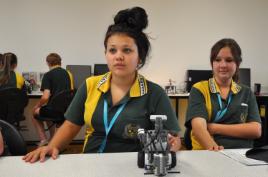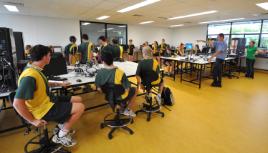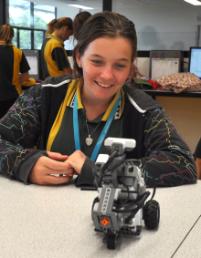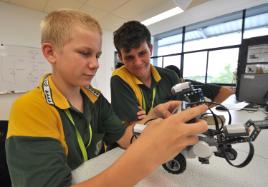School students learn to LEGO and consider fresh career options
Published on 07 March, 2013
The CQUniversity Widening Participation team recently hosted a group of students from Barcaldine State School for their Year 10 Uni Skills Program...
While on the Rockhampton Campus, the visitors took part in sessions on academic writing and educational robotics*, heard from a Defence Force Sergeant and learned about resuscitation in the Paramedic Science labs.

L-R Jazmin Csoma and Zoe Vaughan try out the LEGO engineering activity
Students gained information about career options, the Start Uni Now (SUN) program and scholarships. They also explored the QTAC website, the Moodle online learning environment and visited the local TAFE campus during the two-day program.
Program facilitator, Stacey Hixon says Uni Skills "exposes students to a range of different career options not just university, giving them a taste of university life".

Simon Cumming guides the students through the LEGO engineering activity
"While the students are in Rockhampton they stay at the Student Residences where they dine and interact with university students," Ms Hixon says.
Melinda Mann-Yasso, Acting Program Manager, says "the Uni Skills Program allows students to interact in a range of university learning environments and to access information and equipment designed for university students".
"These experiences are really important for all students but especially those students from regional and remote communities to help them take an active role in making decisions about their futures," she says.
Uni Skills is part of a suite of Engage Education programs delivered by the CQUniversity Widening Participation team to low socio-economic, regional, remote and Indigenous students across Central Queensland, aiming to raise aspirations towards higher education. Details are available via www.cqu.edu.au/wideningparticipation.
* Donated to the University by Bechtel Australia, the AustraliaLego Mindstorms are the next generation in educational robotics and data-logging systems, enabling students to engage in science, technology, engineering and mathematics in a fun and hands-on way. The robots are very versatile and include a myriad of sensors and functions. They can be programmed by individuals and/or teams to undertake simple tasks, such as moving in response to sound, light commands, touch and motion. They enable teams of students to design, build, program, and test robots.

Kimberley Spinks in the Engineering labs 
L-R Chris Haaksma and Luke Cameron

